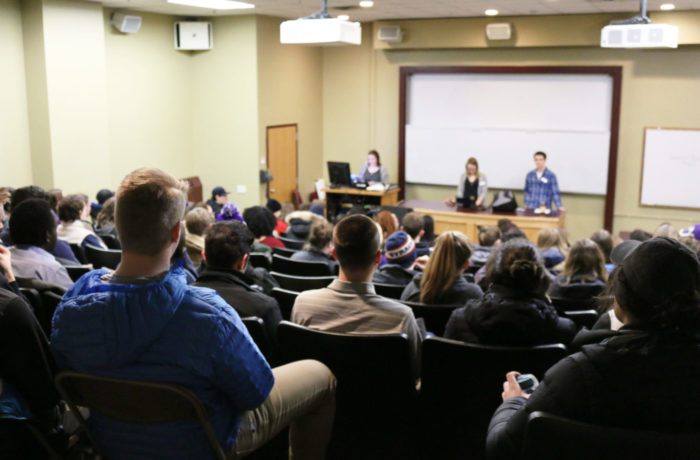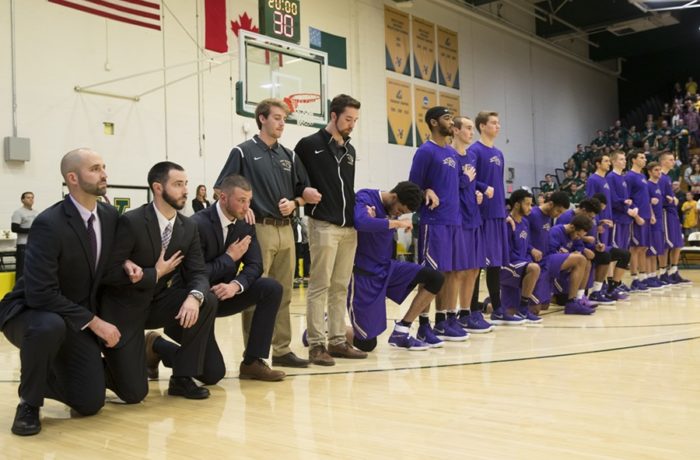
Reaction to the news that retired president John Neuhauser continues to receive his full salary despite not currently working for the college was strong in the St. Michael’s community last month.
“My first reaction to reading the article was frustration and disappointment,” said former student government president Sophie Adams ’18 in an email. “I have been and will continue to be a disappointed alumnus due to the inaction of our administration, faculty leaders, and the Board of Trustees to repair broken systems of oppression at the college. I would say the salary inequality is one of the primary systems of oppression that is in action at the College today.”
As first reported in the Defender March 7, President Emeritus Neuhauser is in a sabbatical year at full-pay. Sabbatical for administrators in retirement is not unusual, according to Paul Hassen, the director of communications and marketing for the National Association of Independent Colleges and Universities [NAICU].
“It’s not uncommon that they would get a year of full pay, or that they would get a payout of a salary that’s been deferred,” Hassen said. “The board of trustees essentially recognized the good work the president has done in their presidency. They entered into this contract with the president, perhaps when he was hired. The terms of that contract is binding with both parties.”
According to the 2016-17 990 tax forms filed by the College on their website, Neuhauser’s compensation topped $475,000. The 2017-18 tax forms will be posted May 15, said Rob Robinson, vice president for finance.
Following the news article’s publication, board of trustees chair Mary Kate McKenna circulated a letter to the faculty and staff explaining the funding as common for senior administrators at the time but noting that a similar sabbatical year has not been offered to current President Lorraine Sterritt. In a second letter, sent just before spring break, McKenna stated that Neuhauser will continue to be paid by the college starting July 1, 2019, “on a part-time basis for one year and a very significantly reduced salary.”
The day before the article was published, some staff department heads received an email asking them to make additional budget cuts and discussed eliminating staff positions due to budget constraints.
“This is something we always ask employees to do and is good practice in any organization,” said President Sterritt. “We do need to control costs and have made good strides, but having additional ideas for savings would be helpful, and the employees are well positioned to identify these ideas. The college evolves over time as the world changes. If there are specific areas that we need to invest in or reduce, we will act accordingly.”
Days after the original article on Neuhausers sabbatical was published Sterritt requested a meeting with the faculty and staff welfare committee chairs and the faculty and staff representatives to the Board of Trustees.
“Basically, the president said she understands that people are very upset, because she had heard from many people directly,” said Faculty Welfare Committee chair Tara Natarajan. “She was there to say to us, ‘Can you talk to me about what you’re hearing from different groups? I want to hear from all of you.’
“I was very candid about what I had heard from faculty, and people are very upset,” Natarajan said.
“We are under very severe resource constraints,” Natarajan said. “As many students know, many positions are no more, and many departments are not being refilled and we are working under what’s called an increased workload agreement for the past couple of years, meaning we’re doing more than we ever thought we’d be doing.”
In reference to the $475,000 compensation from the 990 form, Natarajan said “When you see a number like that, it’s beyond upsetting for faculty and staff. We have to justify $50 here and there, because we’re on a tight budget, and we are doing everything it takes to try and fall within what we’re being asked to do.”
While Sterritt and the vice-president of finance Rob Robinson declined to share the current budget deficit, Sterritt said the school is addressing budget concerns.
“Last year ended on a deficit, but we are working hard on it,” Sterritt said. “While we share some challenges with schools in the region that have faced difficult circumstances, there are important differences, such as our larger enrollment and larger endowment. Like most colleges, we are very focused on enrollment, fundraising, and budget control. We very much appreciate the hard work of all our faculty and staff. We also very much appreciate all who donate to the College and the students, alumni, faculty, staff, trustees, Edmundites, and others who send prospective students our way.”
Despite this, frustration from the faculty, staff, and students was continuously expressed throughout campus after the article was published.
“I can’t say I’m altogether shocked that the salaries of some of the highest paid administrators at our school haven’t changed despite an urgent need to lower salaries for parity sake,” said Adams. “I’m also not shocked that despite being retired, President [Neuhauser] is willingly taking that amount of money away from the college. As a student representative during my time at SMC, I was repeatedly told that we have limited funds to act on really necessary changes.”
Not all students agree with Smith. Current student government president Jake Myers ‘19 says he’s not frustrated by the news.
“When I first saw the article, I was a little confused as to why President Neuhauser was still receiving pay but believed that it may be for him to act as a contact point and aid to President Sterritt during her transition,” Myers said. “I feel there was a lot of confusion and misinformation from students. Once word about payment gets out, rumors and gossip can spread quickly especially about something like this.”
In the week following the news, Mary Kate McKenna, the chair of the board of trustees, sent a letter out to all faculty and staff verifying that Neuhauser was on a paid sabbatical. Multiple attempts to contact Mary Kate McKenna through phone went unanswered.
“It strikes me that there’s been some clarification based on those letters, and I think that’s a good thing because the board is trying to be as transparent as possible,” said secretary to the board of trustees Patrick Gallivan.
Sterritt declined to comment on whether or not the former president had been asked to dissolve his contract.“Sabbaticals are not unheard of – however, what’s the context?” Natarajan said. “We are not where we used to be, when he first became president. If there was some thought given to it, I would’ve hoped they would have re-evaluated at the minimum that particular agreement.”
In response to McKenna’s second letter that Neuhauser will continue working for the college for a year starting in July at a reduced pay, Sterritt declined to comment as to what the reduced pay would be.
“President Emeritus Neuhauser will work next year fostering connections with alumni,” Sterritt said. “It is common practice for a former president to help by supporting alumni and fundraising efforts.”
Natarajan said she feels as though the administration has handled this ongoing controversy well, however, she feels bigger picture – frozen salaries, work load, staffing issues – is not being addressed properly.
“I appreciate the current president’s difficult position,” Natarajan said. “However, we are in a seriously bad environment of pay vs. workload issues and if we don’t address pay and hiring, we could be seeing some real negative effects on future growth of the institution.”

